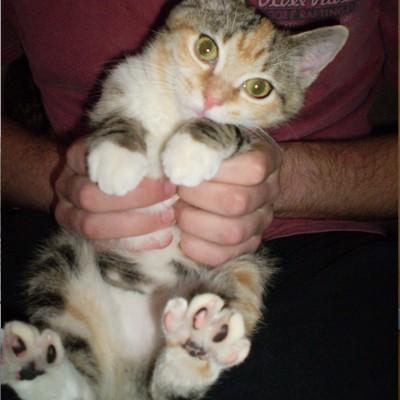By Roslyn McKenna, PetSafe Web Content Specialist
Cats seem to have a million different meows, including “Feed me,” “Stop typing and pet me,” “I hate the dog,” and “Please let me out so I can murder that squirrel by the window.” And cats don’t just use meows to communicate with you either. Your cat’s body language is the best way to understand what your cat is trying to tell you. Learn what your cat is saying with meows and body language, and teach your cat a few words to improve your communication skills.
Cat Body Language
Kneading, slow blinks, headbutts, licking and purring are all signs that your cat is content.  Lily is very comfy on my lap. She’s kneading, purring, and giving slow blinks. When your cat looks at you and slowly opens and closes her eyes, she’s telling you she’s happy and comfortable. She might look like she’s sleepy, but she’s really saying she loves you. You can try to communicate back by doing the same thing. When my cat’s cuddling on my lap and giving me slow blinks, I give her the same look back. She often responds by giving me a headbutt or licking my chin. Purring usually means your cat’s relaxed, but sometimes cats purr when they’re nervous.
Lily is very comfy on my lap. She’s kneading, purring, and giving slow blinks. When your cat looks at you and slowly opens and closes her eyes, she’s telling you she’s happy and comfortable. She might look like she’s sleepy, but she’s really saying she loves you. You can try to communicate back by doing the same thing. When my cat’s cuddling on my lap and giving me slow blinks, I give her the same look back. She often responds by giving me a headbutt or licking my chin. Purring usually means your cat’s relaxed, but sometimes cats purr when they’re nervous.
If you’ve ever been to the vet and wondered why your cat was purring, it’s because she was feeling anxious. Cats purr to comfort themselves when they’re stressed. Your cat’s tail can tell you a lot about her mood. If your cat’s tail is slightly curved or straight and quivering, she’s happy. A puffed-up tail means she’s angry or scared. If her tail’s swishing back and forth, she’s excited or upset.
Teaching Your Cat Your Language
Teaching your cat to speak human is pretty easy too. You’ve probably already trained your cat something, even if you don’t realize it. Does your cat come when she hears the can opener, expecting some tuna juice or wet food? Does she always know when it’s time for snuggling in bed? Do you have a special signal for your cat to come to you, like a crooked finger or a “kitty, kitty, kitty?”
Many cats learn patterns and routines like these easily. You can also deliberately teach your cat. For example, if you want your cat to learn to come when you say the word “treat,” say “treat” repeatedly while shaking the treat bag and giving your cat treats. Or if you want your cat to cuddle in bed with you, say “bedtime” or “sleep” repeatedly as you turn out the lights in the house and go into the bedroom (or whatever your nightly routine is).
Clicker training is another option for training your cat. Cats can learn commands just like dogs can. If you catch your cat on the kitchen counter, say “Down” or “No” in a loud, firm voice. You can also try a short hiss or spit instead, which means “Stop that!” in cat. When your cat does something good, praise or reward her. If you see her using her scratching post, pet her or give her a treat and say “Good kitty!” in a soft, happy voice.
More Cat Translations http://www.wikihow.com/Communicate-with-Your-Cat http://www.humanesociety.org/animals/cats/tips/cat_communication.html http://www.catster.com/cat-behavior/how-to-talk-to-your-cat
How do you communicate with your cat?




